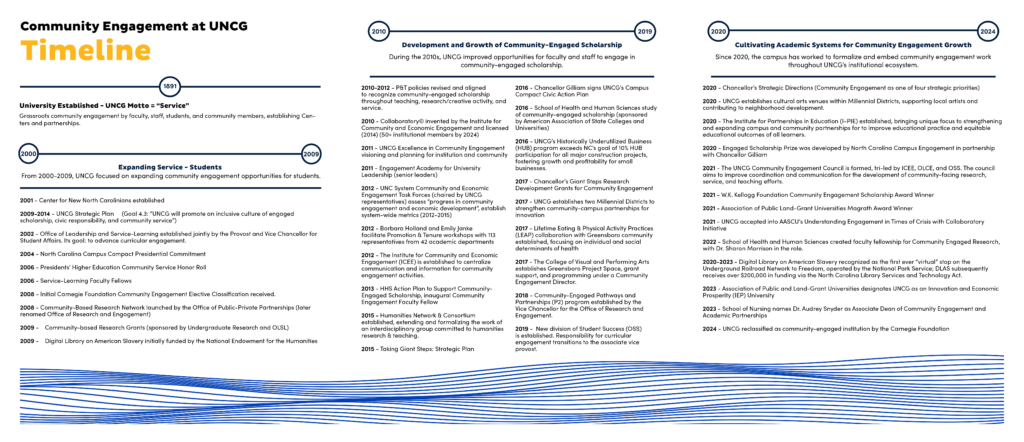Institute History
The Institute builds on decades of previous activities, conversations, and relationships – most especially the work of individual faculty, staff, students, and community colleagues who have worked tirelessly to preserve and enact UNCG’s motto since 1892, “Service.”
BUILDING CAPACITY FOR COMMUNITY ENGAGEMENT – THE MOMENTUM OF A RIVER ECOSYSTEM
Since 2012, ICEE has employed the imagery of a river ecosystem to illustrate many (though not all) of the initiatives, activities, and structures that have built UNCG’s capacity for community engagement. Capacity, as it is used here, is the ability and will to look beyond our walls within the academy to embrace and partner with individuals, groups, and organizations from across all sectors to address the critical issues of our times, from local to global.
The purpose of this timeline, which was updated in 2024 as part of the volume “Continuity and Change in Community Engagement at UNCG,” is not to provide an exhaustive history of factors that led to community-engaged policies. Rather, the purpose is to illustrate key institutional investments and benchmarks comprising the quality and character of UNCG’s commitment to community engagement, as well as the momentum that fuels our current efforts to become even more excellent in this work.
A river ecosystem starts as a trickle, originating as headwaters. The university culture begins with its historical mission and structures. At UNCG, we were founded as the State Normal and Industrial School and then became The Woman’s College of the University of North Carolina. Since our founding, our motto has remained as one word: “service.” As a public university, UNCG was chartered to serve public interests.
The capacity of the river grows as tributaries add water to the stream. As more water flows into the river, the water becomes deeper and the current becomes swifter. Momentum generated by the force of water can become a powerful force. Capacity for community engagement comes from all the activities and efforts of faculty, students, community colleagues, groups, and organizations, university administrators, staff, and alumni. At UNCG, these tributaries include offices such as the Office of Leadership and Service-Learning, and Centers such as the Center for New North Carolinians and the Center for Youth, Family and Community Partnerships, and now the Community Engagement Initiative in the Office of Research and Engagement. It includes student-led service trips, and faculty-led service-learning. It includes community-based research grants, as well as initiatives to support economic development. This diagram is not exhaustive. It only provides some indication of the vast and myriad factors – both formal and informal, both individual efforts and collective initiatives – that have brought us to where we are today.
The capacity of a river is also enhanced by rain that falls from clouds. The swelling number of local, regional, state, national and international associations, conferences, journals, scholars, reports, recognitions, and resources for community engagement has undoubtedly contributed to UNCG’s capacity. These rain clouds are not unique to UNCG, they are shared by most, if not all other institutions of higher education. Many of these resources can be found across this website, particularly on the Definitions and Scholarly Resources pages. Tapping into local and international discourse and resources allows us to accelerate our efforts toward excellence.
Watershed Dates in ICEE history
2008
UNCG’s Institute for Community and Economic Engagement (ICEE) was created in the spring of 2008 in response to the charge from then President of the University of North Carolina System, Erskine Bowles, and the UNC Board of Governors that all campuses would position themselves to respond to the most pressing needs facing the state. ICEE functioned as a virtual organization which bundled all of UNCG’s community and economic engagement activities under one umbrella.
2010
In September 2010, the Community Engagement Initiative (CEI) in the Office of Research and Engagement (ORE) (formerly Office of Research and Economic Development) at UNCG was created to support excellence in community engagement across UNCG and with the greater community. The CEI was established to “support community-engaged scholarship,” a key goal (4.3) of the 2009-2014 Strategic Plan. The Special Assistant for Community Engagement was tasked with implementing a comprehensive and inclusive visioning and planning process to support excellence in community engagement, including exploring and proposing revisions to ICEE, UNCG’s university-wide structure to provide the resources, programs, processes, recognitions, and support needed for community-engaged work.
2012
ICEE was re-launched in July of 2012 as both a virtual and physical presence and advocate of community engagement in response to the implementation plan for Strategic Goal 4.3 that called for establishing an “office” to support community engagement university-wide. ICEE provides one highly visible point of contact for the external community for campus activities related to community and economic development, while providing structure to and support for UNCG faculty, staff, and students interested in community-engaged research, teaching, and scholarship. ICEE brings together community engagement and economic development within one institute in the recognition that pressing social and environmental issues are complex, multi-faceted, and interconnected, and therefore, must be addressed through a full range of approaches and by a full array of stakeholders.
To learn more about these initiatives, or UNCG’s strong momentum generated towards community engagement, contact us at communityengagement@uncg.edu.
